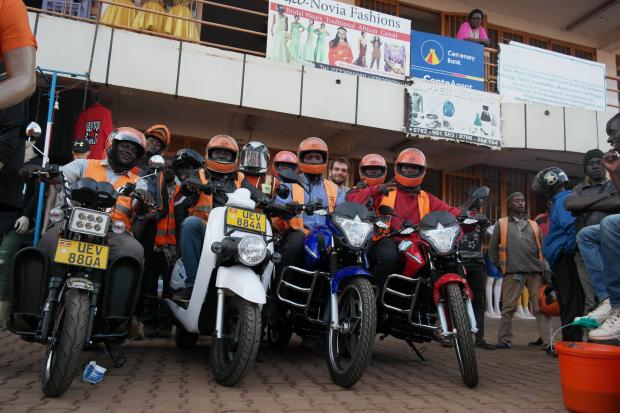The traffic in Uganda’s capital Kampala is nothing for the faint of heart. Cars, public minibuses and Uber drivers all compete for space on the road. In addition to that, there are an estimated 300,000 motorbike taxis too, so-called “boda bodas”, which are an integral part of the cityscape. The actual numbers may be even higher, as many of the motorbikes aren’t registered.
On almost every street corner you see groups of young men leaning against their motorbikes waiting for customers. The number of passengers or other cargo is negotiable – it is not uncommon to see whole families piled on. And they’re handy for tranporting furniture too. Very few people walk in the centre of Kampala. The inevitable results of all these different means of transport? Congested roads and polluted air. Especially travelling on the back of a boda boda, you soon notice the exhaust fumes in your lungs. It’s no wonder, then, that Kampala ranks 28th among the 30 most polluted cities in the world.
Daniel Dreher was working for a solar company in Kampala when he came up with the idea of turning the popular motorbike taxis electric. His vision: emission-free vehicles powered by replaceable batteries, which are recharged using solar energy, greatly reduce local emissions. He’s been working on the project together with his co-founder Étienne Saint-Sernin since October 2017. They first founded Zembo in France and have been on the road in Uganda since August of last year. In October 2018, the first six motorcycles were reached Uganda. They were produced in China.
“China has an incredibly huge market for electric motorbikes. We were there in December, and you practically can’t find combustion motorbikes anymore. They no longer exist. In two weeks we saw maybe five or ten. Accordingly, the technology is a lot more developed too,” says Daniel about his experiences in China, where he met with the bikes’ producers.
Sun Power in Place of Petrol
Currently, the founders are still in the pilot phase and are working with some riders to test the six electric motorcycles. They’ve driven over 12,000 km since October. “People often ask: ‘Where is your engine?'” says Asiku, one of Zembo’s test riders.
 ©
© The startup may still be in its early days, but Zembo has big plans: The next motorbikes will be delivered in April and the first solar charging station is to be ready by then. By the end of the year, 200 riders are expected to be on the road in Kampala on electric motorbikes and up to five charging stations will provide a point of contact to replace the empty batteries. The batteries are simply replaced in about two minutes and the driver can continue driving. The batteries are then recharged with solar energy at the charging station in three to four hours.
“These plans are very finance-intensive. That’s why investment is always needed and always welcome,” says Daniel when talking about Zembo’s future plans. Another feature of the startup: the drivers who lease the vehicles become owners after two years. This is unusual on the current market. Cuurently, drivers often lease the boda bodas for years without ever owning the vehicle themselves, meaning they have rental expenses that eat into their daily profits considerably. “These are the two things we do,” says Daniel. “We lease the motorcycles and we charge the batteries and rent them out. This will generate 60 per cent more income for the drivers.” In the future, the plan is for the motorbikes to be produced in Uganda too – meaning job creation and easier repairs.
On one battery charge the motorcycles can travel 50 and 80 km, approximately the same range as with petrol. The reason for this is that right now drivers often only top up a few litres of petrol with the money they have earned so far that day. But if they have a good network of charging stations and it becomes a habit to stop and replace the battery, then there are no disadvantages to electric motorcycles. So overall it’s a win-win all around: better working conditions and earning potential for the drivers, reduced emissions and better air quality for everyone.
This is a translation by Marisa Pettit of an original article which first appeared on RESET’s German-language site.






